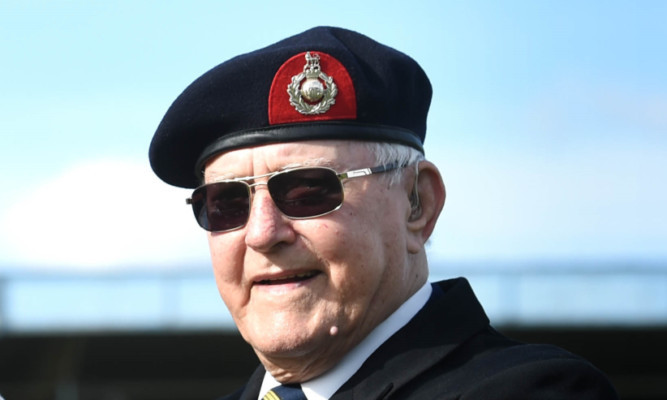The daughter of a Polish woman liberated from a notorious Nazi death camp has sent a heartwarming message to an Angus war hero.
Barbara Matuszczak said the kindness of Alexander Adam and the soldiers, nurses and doctors would never be forgotten by the families of those who were liberated.
Mr Adam from Forfar watched as the infamous Bergen-Belsen Nazi concentration camp was burned to the ground by British troops after liberation in 1945.
It is estimated 52,000 people were killed in the concentration camp and Mr Adam was part of the occupational forces sent there after peace was declared in 1945.
Mrs Matuszczak sent the kind words to Mr Adam after stumbling upon an article of his memories of the camp on The Courier’s website following the 70th anniversary of VE Day.
She said: “My mother Krystyna was involved in the Warsaw Uprising with her father and her brothers Ryzsard and Jerzy.
“She was taken to Stutthof, Neuengamme and Bergen-Belsen concentration camps where she experienced unimaginable horrors.
“Mum was eventually liberated with gangrene in both legs, typhus, dysentery, a broken nose and covered in lice.
“She suffered terribly but survived after 10 months in hospital. Later she married a paratrooper at Arnhem and had four children.
“She enjoyed her life but has sadly now passed on.
“But she always spoke of the help and kindness she received from the soldiers, nurses and doctors.”
Mrs Matuszczak said her mum never met Mr Adam but she wanted to wish him a “wonderful life” because men like him “are very special”.
“What they did will never be forgotten,” she added.
After the outbreak of the Second World War the Wehrmacht set up a camp for Belgian and French prisoners of war in huts at the edge of the Bergen Military Training Area.
The camp was significantly expanded in the spring of 1941.
Following the German invasion of the Soviet Union, more than 21,000 Soviet POWs were deported to the camp until the autumn of 1941.
Nazi leaders drew up what they called the ‘final solution’ to what they called the ‘Jewish question’.
From then on, Nazi Germany was devoted increasingly to this ‘final solution’.
More concentration camps were built, some with gas chambers designed for mass murder.
Jews all over Europe, from Norway to Greece, were hunted down, arrested, listed, ferried on trains for hundreds of miles and then murdered or worked to death.
In April 1943, the SS took over the southern section of the camp and turned it into an “exchange camp” for Jewish prisoners.
When the Bergen-Belsen concentration camp was liberated on April 15 1945, British soldiers found thousands of unburied bodies and tens of thousands of severely ill prisoners.
